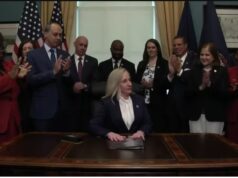crossposted from the Great Orange Satan at the request of KathyinBlacksburg
Our last day with students was Wednesday, for teachers Thursday. Our report back day is August 16, which happens to be one of the days for which we are furloughed to save the district money – which also means many teachers may refuse to report because they are not being paid. I will cross that bridge later.
Today I will travel to Westtown school in Pennsylvania to honor David Mallery, an extraordinary educator well-known in independent school circles who got me to participate in his amazing Westtown seminar, which empowered me to rethink my own approach to teaching.
Before I travel North from Virginia, allow me to ruminate online. As I do, you can imagine the music from Ennio Morricone in the background. In fact, I promise to share it with you at the beginning of the jump, just to set the tone!.
I invite you to continue reading.
There is much that was good this school year. Yes, I was honored for my teaching with an award, but that is of lesser importance.
Only 7 out of the almost 180 students who finished the year did not pass the course they took with me. One was on suspension pending expulsion, and 5 of the remaining 6 simply made no effort. The last (whom I will call “L”) did it to himself. He merely needed to pass the final quarter. He refused to do his final project and made almost no effort on his final exam, dropping his mark for the quarter to a 57. Still, he learned enough that he may have passed the state exam, and he should easily pass the course when he retakes it, perhaps this summer. He had been put up for expulsion for bringing a knife to school, so when he was allowed to return he had missed a lot of work. For one marking period he made a real effort. His refusal to follow through might more properly belong in the category of the Ugly, but I will not allow it to diminish the overall accomplishment of my students.
The final projects this year including some truly amazing ones, not always from the students who did the best on more conventional indicators of learning. That is why I love empowering them to demonstrate knowledge in a form other than essays or in the multiple choice tests they must experience to do well on the state and AP exams. Knowing that, I plan this summer to step back and rethink my courses, including AP, to allow more of this during the school year.
The bad – there are still too many I am not reaching in time. They may receiving a passing grade and thus get credit for the course. But they are not getting from the course what they could, and here it is less a question of the grade earned than of connecting with the material they study. I need to be more proactive in trying to make those connections. I need to remember that having received my teaching award and been told in evaluation how “distinguished” my teaching is, I can afford to take risks in order to try to connect with the students. It is hard with up to 38 in a class, and next year our average class sizes will increase because of financial pressures. That is not the fault of the kids, and I must do whatever I can to ensure it does not interfere with their opportunity to have a positive learning experience.
Le’s return to Morricone, in this case with the composer conducting:
The ugly – the really ugly is seeing the kids we lose to suspensions and expulsions. On a smaller scale, it is when I have to have a child removed from class even for one period – it is an admission that I am not reaching that student, but sometimes I can no longer take the time and need to address the needs of the other 30+ young people in the room. It is one thing that continues to agonize.
As does when I realize I am too irritable, and thus too impatient with one or more students. That is my failing. Sometimes I let what happens in one class affect how I act in another class in a negative way. That is unfair to both classes.
What is bad and ugly is the structure of the school day. We have 8 period running from 8:25 until 3:05 (with an additional “zero” period from 7:15 – 8:00). First is 50 minutes to allow for announcements. Each subsequent period is 45 minutes, with only 5 minutes between periods. That leaves little time to unwind, especially if one has to rush to get from one end of our sprawling building to another. We also have more than 20 “temporary” classrooms outside. Somehow I wish we could restructure the school day for some down time for the kids, beyond the one lunch period, which for some is the 3rd and others the 7th period of the day. This year I had my three regular level classes immediately followed by an AP class to start the day, and in the first half of the year I immediately had 15 minutes of hall duty. 5 minutes between classes is not enough time for me to reflect and readjust, especially when I am transitioning from one preparation (regular government) to the other (AP). There is no perfect schedule, so I have to adjust to what I am given, and try to make it a more comfortable learning setting for the students.
I can look back. I also have to look ahead. And I have to recognize that I am now in my mid 60s. I do not have the energy I did even two years ago, and must pace myself. That means that I have to take on less outside of my teaching responsibilities if I want to remain effective in the classroom. Unfortunately that is not always as possible as I might wish. I really need to serve as a mentor to other teachers, especially those undergoing the process of obtaining National Board certification. I have been asked to take on more on behalf of the profession of teaching because I am viewed as an effective advocate: this includes advising people involved in the governance of our school system as well as those things I do to try to influence educational policy at state and national levels. In order to have the time for these I will again not be coaching or advising any student activities, which I sorely miss. I will not have enough time to watch athletic, musical and dramatic performances, important as a means of affirming to my students that I see them as whole persons, not just as an occupant of a seat in my room for 45 minutes a day.
One thing I know I will do more often is to write individual notes to students. I did it over one long break this year. I think I need to do it en masse at least 3-4 times a year, and on occasion to specific students. And I want to be sure to be proactive in contacting parents when a student shows improvement or does something good. Too often we teachers get so crushed for time that we only initiate contact with parents when there is a problem, and that is not fair. I will again begin my school year by calling all my families to try to establish a cooperative relationship on behalf of the students.
on behalf of the students – that is the key. That is the entire raison d’etre for the the work that I do. In the National Board process we present our portfolios with a reflection on each piece offered: how does this benefit the students?
And that should also be the question we are asking as we make educational policy, and too often we do not. Perhaps that is something I can remember during my own participation in advocating about education, in how I write about schools and students and learning and teaching.
David Mallery taught generations of educators, primarily in independent schools, how to think more broadly, to get outside of rigid models, to consider alternative ways of thinking about what we do. It is appropriate that I offer this reflection on a day when many of us who experienced him will gather to honor his legacy.
The best way to honor that legacy is to embody it in our own teaching.
Which is perhaps why using the title of a Leone spaghetti western is actually strangely appropriate: it requires me to take a different point of view as I look back. Looking back to see where I have traveled is a necessary precondition to understanding where I am. And only when I understand where I am and how I got here can I look forward to see where I next can go.
Which for me reminds me of Eliot, in “Little Gidding” (which remains my favorite poem). Somehow it seems appropriate to apply my favorite words to this process of reflection and planning.
I will end with those, after offering one more selection from Morricone. Just remember, life is always a great deal more than a fistful of dollars:
And now to the Eliot. I do find the words apropos of the teaching process, even if Eliot’s intent in writing them was quite different. That is part of the learning process, which makes it part of the teaching process, to find value and meaning in ways that might not have been planned?
In advance, let me wish you peace.
We shall not cease from exploration
And the end of all our exploring
Will be to arrive where we started
And know the place for the first time.
Through the unknown, unremembered gate
When the last of earth left to discover
Is that which was the beginning;
At the source of the longest river
The voice of the hidden waterfall
And the children in the apple-tree
Not known, because not looked for
But heard, half-heard, in the stillness
Between two waves of the sea.
Quick now, here, now, always-
A condition of complete simplicity
(Costing not less than everything)
And all shall be well and
All manner of thing shall be well
When the tongues of flame are in-folded
Into the crowned knot of fire
And the fire and the rose are one.











